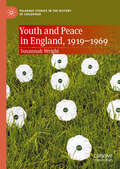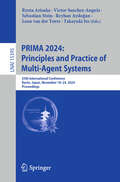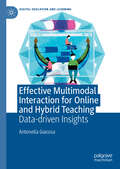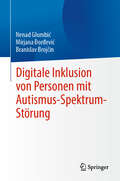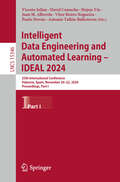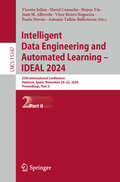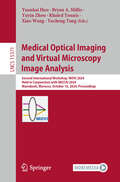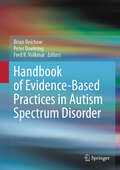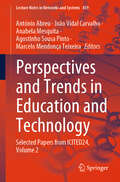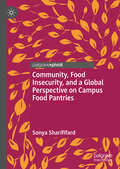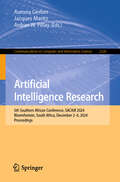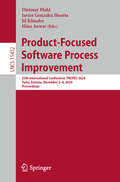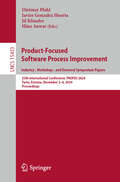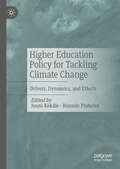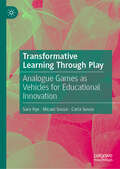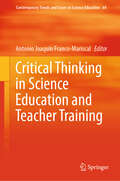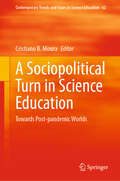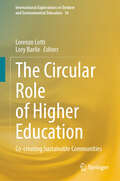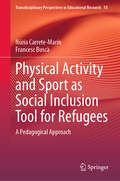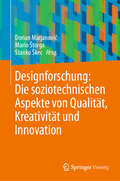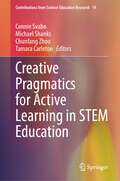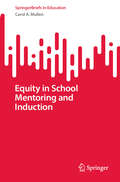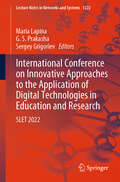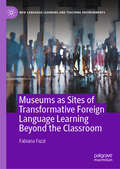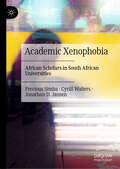- Table View
- List View
Youth and Peace in England, 1919-1969 (Palgrave Studies in the History of Childhood)
by Susannah WrightThis book offers an historical analysis of an area of young people's activity which remains significant in the present. It shows that many thousands of young people in England were involved in peace movement activity from 1919 to 1969, in connection with the League of Nations Union before the Second World War, pacifist bodies like the Peace Pledge Union in the 1930s and 1940s, the Council for Education for World Citizenship post-1945, and the Campaign for Nuclear Disarmament from 1957. Young people engaged with the peace movement at school, at home and in the community, encompassing classroom learning, attending lectures and meetings out of school hours, pageants, international camps and visits, correspondence, and sometimes demonstrations, marches and other direct action protests. Some were engaged briefly, for others this became a long-term focus of time, energy, and ideological commitment. Some followed parents, teachers, and friends. Others rebelled against those around them. Examining the perspectives of those involved as young people, and the adults aiming to involve young people in the peace movement, this book is an important addition to our knowledge about movements and activism (in the peace movement and more broadly), and to our knowledge about young people's agency and its limits.
PRIMA 2024: 25th International Conference, Kyoto, Japan, November 18–24, 2024, Proceedings (Lecture Notes in Computer Science #15395)
by Takayuki Ito Sebastian Stein Reyhan Aydoğan Victor Sanchez-Anguix Leon van der Torre Ryuta ArisakaThis book constitutes the refereed proceedings of the 25th International Conference on Principles and Practice of Multi-Agent Systems, PRIMA 2024, held in Kyoto, Japan, during November 18–24, 2024. The 23 full papers and 10 short papers presented in this volume were carefully reviewed and selected from 76 submissions. They are organized in the following topical sections: coordination and cooperation; market approaches; logics; learning; agent-based modelling and simulation; computational social choice.
Effective Multimodal Interaction for Online and Hybrid Teaching: Data-driven Insights (Digital Education and Learning)
by Antonella GiacosaThis book provides educators (including but not limited to those at university level) with data-driven insights into video-mediated interaction. Drawing on extensive research on classroom interaction from a variety of theoretical and analytical perspectives, including four years of observing online university courses that began during the Covid-19 pandemic, the author provides deep insights into video-mediated interaction by comparing direct classroom observations with data provided by teachers and students via online questionnaires. The book clarifies how the newly experienced classroom contexts differ from traditional online and blended classes, then draws on the extensive experience of video-mediated instruction in terms of teacher-learner, learner-content, and learner-learner interaction to decipher what can be challenging and promising about interacting via a screen, specifically addressing multimodal interaction. It also provides practitioners with data-driven suggestions from the perspective of teachers and learners for improving teaching and learning in modern video-based educational contexts that are consistently different from the pre-pandemic idea of e-learning. This book will be a valuable resource for researchers in Applied Linguistics, Language Education and Higher Education more broadly, teachers in higher education institutions worldwide, and teacher education and training and institutional bodies responsible for improving teaching facilities.
Digitale Inklusion von Personen mit Autismus-Spektrum-Störung
by Nenad Glumbić Mirjana Đorđević Branislav BrojčinDieses Buch untersucht Chancen und Hindernisse für die digitale Inklusion von Personen mit Autismus-Spektrum-Störung (ASS). Es behandelt die grundlegenden Anforderungen der „digitalen Gesellschaft“ sowie Konzepte der digitalen Inklusion (und Exklusion), der digitalen Teilhabe und der digitalen Kluft bei Behinderungen und bietet Unterstützung für Personen mit Autismus bei der Mitgestaltung digitaler Geräte. Das Buch diskutiert die Anwendung digitaler Technologien in verschiedenen Kontexten, einschließlich Bildung, Freizeitaktivitäten, Gemeinschaftsleben, alltäglichen Lebensfähigkeiten und Beschäftigung von Personen mit Autismus. Behandelte Bereiche umfassen: Computerbasierte Interventionen zur Sprachentwicklung, sozialen Kommunikation, exekutiven Funktionen und anderen Fähigkeiten bei Kindern mit Autismus. Digitale Gesundheitsinterventionen für Personen mit ASS. Risiken für Personen mit ASS im Internet (z.B. übermäßige Nutzung, süchtiges Verhalten und Cybermobbing). Nutzung digitaler Technologien zur Simulation von Vorstellungsgesprächen und zur Vermittlung von Arbeitsfähigkeiten. Nutzung digitaler Technologien in Selbstvertretungsaktivitäten von Personen mit Autismus. Digitale Inklusion von Personen mit Autismus-Spektrum-Störung ist ein unverzichtbares Nachschlagewerk für ForscherInnen, ProfessorInnen, DoktorandInnen, KlinikerInnen sowie verwandte TherapeutInnen und Fachleute in der klinischen Kinder- und Schulpsychologie, der Sozialarbeit, der Verhaltenstherapie/Rehabilitation, der Pädiatrie, der Physiotherapie, der Ergotherapie, der Sprachtherapie, der Neurologie, der Sonderpädagogik, der Kinder- und Jugendpsychiatrie sowie der Entwicklungspsychologie.
Intelligent Data Engineering and Automated Learning – IDEAL 2024: 25th International Conference, Valencia, Spain, November 20–22, 2024, Proceedings, Part I (Lecture Notes in Computer Science #15346)
by Paulo Novais David Camacho Vicente Julian Hujun Yin Juan M. Alberola Vitor Beires Nogueira Antonio Tallón-BallesterosThis two-volume set, LNCS 15346 and LNCS 15347, constitutes the proceedings of the 25th International Conference on Intelligent Data Engineering and Automated Learning, IDEAL 2024, held in Valencia, Spain, during November 20–22, 2024. The 86 full papers and 6 short papers presented in this book were carefully reviewed and selected from 130 submissions. IDEAL 2024 is focusing on Big Data Analytics and Privacy, Machine Learning & Deep Learning for Real-World Applications, Data Mining and Pattern Recognition, Information Retrieval and Management, Bio and Neuro-Informatics, and Hybrid Intelligent Systems and Agents.
Intelligent Data Engineering and Automated Learning – IDEAL 2024: 25th International Conference, Valencia, Spain, November 20–22, 2024, Proceedings, Part II (Lecture Notes in Computer Science #15347)
by Paulo Novais David Camacho Vicente Julian Hujun Yin Juan M. Alberola Vitor Beires Nogueira Antonio Tallón-BallesterosThis two-volume set, LNCS 15346 and LNCS 15347, constitutes the proceedings of the 25th International Conference on Intelligent Data Engineering and Automated Learning, IDEAL 2024, held in Valencia, Spain, during November 20–22, 2024. The 86 full papers and 6 short papers presented in this book were carefully reviewed and selected from 130 submissions. IDEAL 2024 is focusing on Big Data Analytics and Privacy, Machine Learning & Deep Learning for Real-World Applications, Data Mining and Pattern Recognition, Information Retrieval and Management, Bio and Neuro-Informatics, and Hybrid Intelligent Systems and Agents.
Medical Optical Imaging and Virtual Microscopy Image Analysis: Second International Workshop, MOVI 2024, Held in Conjunction with MICCAI 2024, Marrakesh, Morocco, October 10, 2024, Proceedings (Lecture Notes in Computer Science #15371)
by Xiao Wang Yuankai Huo Bryan A. Millis Yuyin Zhou Khaled Younis Yucheng TangThis book constitutes the refereed proceedings of the Second International Workshop on Medical Optical Imaging and Virtual Microscopy Image Analysis, MOVI 2024, held in conjunction with the 26th International Conference on Medical Imaging and Computer-Assisted Intervention, MICCAI 2024, in Marrakesh, Morocco, in October 2024. The 21 regular papers presented at MOVI 2024 were carefully reviewed and selected from 29 submissions. They are grouped into these two topical sections: Medical Optical Imaging and Virtual Microscopy Image Analysis and Kidney Pathology Image segmentation (KPIs) Challenge.
Handbook of Evidence-Based Practices in Autism Spectrum Disorder
by Fred R. Volkmar Peter Doehring Brian ReichowThe handbook examines the empirical status of interventions and treatments for individuals with autism spectrum disorder (ASD). It offers an insightful and balanced perspective on topics ranging from the historical underpinnings of autism treatment to the use of psychopharmacology and the implementation of EBPs. The book reviews the conceptualization of evidence-based practices (EBPs) as well as considerations for implementing such practices across settings. In addition, it describes emerging treatments – though they cannot yet be considered evidence-based – that have produced limited but highly promising results. The book also describes treatments and therapies that have been proved ineffective. It explores ways in which EBPs can be applied in inclusive school settings, pedatric settings, in-patient treatment progams, and college-based programs for transition-aged youth. The volume describes outcomes from the development of EBP guidelines at the national level (in Scotland) and, more broadly, in the United States and outlines how such guidelines can be adapted to offer more individualized intervention. Key areas of coverage include: Comprehensive treatment models, including early intensive behavioral intervention, pivotal response treatment, Early Start Denver Model, and Naturalistic Developmental Behavioral Interventions. Focal treatments addressing the core deficits of ASD and its co-occuring conditions. Social skills, communication, and the use of applied behavior analysis (ABA) practices for teaching new skills and decreasing challenging behaviors. Sensory-based interventions, psychopharmacology, cognitive behavior therapy, and parent education programs (e.g., Project ImPACT). The Handbook of Evidence-Based Practices in Autism Spectrum Disorder is an invaluable resource for researchers, professors, and graduate students as well as clinicians, therapists, and all professionals working in the fields of developmental, clinical child, and school psychology, pediatrics, social work, behavior analysis, allied health sciences, public health, child and adolescent psychiatry, early childhood intervention, and general and special education.
Perspectives and Trends in Education and Technology: Selected Papers from ICITED24, Volume 2 (Lecture Notes in Networks and Systems #859)
by Anabela Mesquita António Abreu João Vidal Carvalho Agostinho Sousa Pinto Marcelo Mendonça TeixeiraThis book from the LNNS Series is composed of the best selected papers accepted for presentation and discussion at the 2024 International Conference in Information Technology & Education (ICITED’24). The ICITED is a multidisciplinary conference with a special focus on new Technologies and Systems in the Education sector and was held between July 11 and 13, 2024. The ICITED’24 was supported by the Pernambuco University, Recife, Brazil, and by IADITI—International Association for Digital Transformation and Technological Innovation. The International Conference in Information Technology & Education is an international forum for researchers and professionals in the education sector, which enables the discussion of the latest innovations, trends, and concerns in several areas, in the education sector, associated with information technologies and systems. It is an event for professionals in the sector, in search of technology solutions, where academics, IT experts, and business managers meet to discuss new ideas that help them maximize the potential of learning processes through technology. The ICITED’24 Scientific Committee is composed of a multidisciplinary group of 143 experts who assessed some 262 papers from 26 countries, received for each of the main topics proposed for the conference. The papers accepted for presentation and discussion at the conference are published by Springer and will be submitted for indexing by ISI, SCOPUS, EI-Compendex, Google Scholar, and SpringerLink.
Community, Food Insecurity, and a Global Perspective on Campus Food Pantries
by Sonya SharififardThis book explores food accessibility and its relationship to food security in communities representing high populations of college and university students. Each chapter offers readers a vivid and multifaceted perspective on food practices' cultural and social complexities and the current food system. Using insights from the multidisciplinary fields of food studies, educational leadership, and human geography, this book engages the global paradoxes of food. Food is individual and community-based, and students participating in school activities and extracurriculars must often choose between affording books or food. Each chapter begins with a case study and ends with suggested resources and activities. Chapter topics include academic success, identity and belonging, groceries, food media, public health, marketing, surplus and scarcity, and social impact. The book further blends concepts and empirical accounts to address the central issues of culture, structure, and accessibility within and among the food retail environment.
Artificial Intelligence Research: 5th Southern African Conference, SACAIR 2024, Bloemfontein, South Africa, December 2–6, 2024, Proceedings (Communications in Computer and Information Science #2326)
by Aurona Gerber Jacques Maritz Anban W. PillayThis book constitutes the refereed proceedings of the 5th Southern African Conference on Artificial Intelligence Research, SACAIR 2024, held in Bloemfontein, South Africa, during December 2–6, 2024. The 29 full papers presented in these proceedings were carefully reviewed and selected from 101 submissions. The papers are organized in the following topical sections: algorithmic and Data Driven AI; socio-technical and human-centred AI (Information Systems); responsible and Ethical AI (Philosophy, Law and Humanities); symbolic AI and Knowledge Representation and Reasoning.
Product-Focused Software Process Improvement: 25th International Conference, PROFES 2024, Tartu, Estonia, December 2–4, 2024, Proceedings (Lecture Notes in Computer Science #15452)
by Dietmar Pfahl Jil Klünder Javier Gonzalez Huerta Hina AnwarThis book constitutes the refereed proceedings of the 25th International Conference on Product-Focused Software Process Improvement, PROFES 2024, held in Tartu, Estonia, during December 2–4, 2024. The 18 full papers, 12 short papers, 9 Industry papers, 2 Workshop papers, 2 Doctoral symposium papers, and one Keynote paper presented in this volume were carefully reviewed and selected from 85 submissions. The main theme of PROFES 2024 was professional software process improvement (SPI) motivated by product, process, and service quality needs. The technical program of PROFES 2024 was selected by a committee of leading experts in software process improvement, software process modeling, and empirical software engineering.
Product-Focused Software Process Improvement. Industry-, Workshop-, and Doctoral Symposium Papers: 25th International Conference, PROFES 2024, Tartu, Estonia, December 2–4, 2024, Proceedings (Lecture Notes in Computer Science #15453)
by Dietmar Pfahl Jil Klünder Javier Gonzalez Huerta Hina AnwarThis book constitutes the refereed proceedings of the 25th International Conference on Product-Focused Software Process Improvement, PROFES 2024, held in Tartu, Estonia, during December 2–4, 2024. The 9 Industry papers, 2 Workshop papers, 2 Doctoral symposium papers and 1 Keynote paper presented in this volume were carefully reviewed and selected from 85 submissions. The contributions were organized in topical sections as follows: Industry Papers; Third Workshop on Engineering Processes and Practices for Quantum Software (PPQS 2024); and Doctoral Symposium Papers.
Higher Education Policy for Tackling Climate Change: Drivers, Dynamics, and Effects
by Rómulo Pinheiro Jouni KekäleThis book investigates the roles of universities and other types of higher education institutions in tackling climate change. Climate change is arguably the most pressing concern of our era, and one of the biggest challenges humanity has faced. In line with this, there is a firm belief that higher education institutions are among the key actors in the fight against climate change, especially in providing innovations and new technologies to mitigate the issue. A steadily growing number of universities across the world are playing a leading role in the fight for a sustainable world. Bringing together scholars from around the world, this volume adopts an interdisciplinary approach to investigate the effects resulting from the complex interplay between national, regional and global higher education policy initiatives aimed at tackling climate change. It will appeal to all those interested in climate change, science and innovation, public policy and higher education governance. Chapters 1, 2 and 8 are available open access under a Creative Commons Attribution 4.0 International License via link.springer.com.
Transformative Learning Through Play: Analogue Games as Vehicles for Educational Innovation
by Sara Rye Micael Sousa Carla SousaThis book explores analogue game-based learning in the context of the Anthropocene, addressing an urgent need for educational approaches beyond traditional scholastic boundaries. In the context of a complex world, the book emphasises the inadequacies of current educational methods and the potential of game-based learning to foster collective problem-solving skills. It then traces the historical roots of analogue and tangible games, highlighting their potential and challenges in alignment with several learning theories. The authors explore the psychology of analogue game-based learning, exploring its impact on cognition, motivation and, potentially, skill transfer to real life situations. They focus strongly on designing effective learning games, emphasising principles of game design, the TEGA initiative and common pitfalls to avoid. Ultimately, the book emphasises the importance of inclusivity in game-based learning, addressing barriers, intersectionality, and accessible design features both for commercial and educational games, and highlighting the ethical and pedagogical significance of fostering diverse and inclusive learning environments. The book will be of interest to researchers and students of education-related topics, particularly instructional design, pedagogical, and psychology, as well as enthusiasts from game studies and related practitioners.
Critical Thinking in Science Education and Teacher Training (Contemporary Trends and Issues in Science Education #2)
by Antonio Joaquín Franco-MariscalThis edited volume explores the challenge of fostering critical thinking (CT) skills in science education, presenting the ENCIC-CT model as a framework for development. Named after the Science Education and Competences (Enseñanza de las Ciencias y Competencias, ENCIC) research group at the University of Malaga, Spain, this model emphasizes cultivating CT through socio-scientific issues and daily-life problems. It includes three key domains: knowledge, skills, and dispositions, each encompassing various dimensions addressed through scientific practices like argumentation, inquiry, and modeling. Teaching strategies such as gamification, role-playing, micro-debates, augmented reality, controversy mapping, and digital storytelling are highlighted. Spanning theoretical perspectives and practical experiences from early childhood to higher education, this book consolidates findings from the Spanish R&D project, “Citizens with Critical Thinking: A Challenge for Teachers in Science Education.” It is an essential resource for educators, researchers, and practitioners, offering valuable insights and practical applications for all educational levels.
A Sociopolitical Turn in Science Education: Towards Post-pandemic Worlds (Contemporary Trends and Issues in Science Education #62)
by Cristiano B. MouraThis edited volume features a collection of essays on the COVID-19 pandemic and associated crises and its implications for science education research and practice from a socio-political perspective. Taking the pandemic as a starting point – and understanding the pandemic as an event that exposes science-society relationships in their complexities –, this book sets provocations for the science education community, analyzing aspects of its practices, conceptualizations, aims, core values, research traditions, institutions, affectivities, and aesthetics from diverse points of view, and proposing new postures for the future of science education. Some central themes to science education research such as the concepts of scientific literacy and nature of science (among others) are revisited, and new perspectives related to affects, multiculturalism and the knowledge-power relationships are explored. This book brings together authors from diverse backgrounds, geographic origins, and academic trajectories, composing a truly international volume with a plurality of voices weaving a rich caleidoscope seeking to analyze science education's current state of affairs and propose diverse futures under a socio-political perspective.
The Circular Role of Higher Education: Co-creating Sustainable Communities (International Explorations in Outdoor and Environmental Education #2)
by Lorenzo Lotti Lory BarileThis edited volume presents a series of case studies and research evidence on how global students contribute to widening the debate on sustainability within Higher Education institutions: by offering their own stories, along with academics and external stakeholders they create a unique context where their diverse backgrounds are combined into a wider learning experience. This environment enables them to return to their communities and provide leadership and support in tackling real life sustainability related issues they may face. This book describes this circular and virtuous process, which we refer to as Circular Education. Through this process, Higher Education institutions are enriching environments and supporting communities and their cultural hubs. Readers will discover how students can add to and learn from this critical dialogue with peers, academics, and external stakeholders.It is of interest for students, policymakers, academics and any other institution and organization interested in promoting sustainability in Higher Education.
Physical Activity and Sport as Social Inclusion Tool for Refugees: A Pedagogical Approach (Transdisciplinary Perspectives in Educational Research #10)
by Núria Carrete-Marín Francesc BuscàThis book addresses the social benefits of physical activity and sport in promoting the social and educational inclusion of refugees living in Europe in line with Sustainable Development Goals 4, 10 and 16. It provides a theoretical framework supported by evidence obtained from a case study in the Spanish context. The book demonstrates how universities and formal and non-formal educational institutions, by means of service-learning activities managed by physical and social educators, enable refugees and students to practice physical activity, develop further learning and establish stable social networks. It shows how a pedagogical approach to physical activity can improve relationships between students and refugees and promote inclusion of all. It discusses the value of diversity in education and educational research, as well as transdisciplinarity in new educational and research approaches.
Designforschung: Die soziotechnischen Aspekte von Qualität, Kreativität und Innovation
by Mario Štorga Dorian Marjanović Stanko ŠkecDas Buch bietet einen ganzheitlichen Einblick in die Designforschung, eine umfassende und zusammenhängende Vision des neuesten Wissens über die Schaffung und Verbesserung hochwertiger Produkte, Kreativität und Innovation. Die Beiträge in diesem Band dienen als erhellender Kompass für das Verständnis der Ingenieurdesignforschung und bieten eine umfassende Perspektive auf Produktentwicklung, Kreativität, Innovation, Erfindung und Produktivität, indem sie die historische Entwicklung der Designwissenschaft aufzeigen und die Grenzen der Ingenieurdesignforschung erkunden. Die vorgestellten Bildungsprojekte wurden an EU-Universitäten durchgeführt und bieten Einblicke für zukünftige Designkurse. Zentral in den Diskussionen ist die entscheidende Rolle der soziotechnischen Dimensionen im Ingenieurdesign, wobei Fragen der Kreativität, Qualität, menschzentrierter Methoden und der Anforderungen neuer Technologien erörtert werden, die ihre entscheidende Rolle für den Erfolg des Ingenieurdesigns betonen. Der Text bietet einen panoramischen Überblick über den aktuellen Stand der Designforschung und kritische Themen und liefert eine umfassende Übersicht für junge Forscher. Pädagogen und Mentoren werden ihr Wissen vertiefen, während Experten ihre Methoden und Werkzeuge verfeinern.
Creative Pragmatics for Active Learning in STEM Education (Contributions from Science Education Research #14)
by Michael Shanks Tamara Carleton Connie Svabo Chunfang ZhouThis edited volume is an invitation to redesign STEM higher education. It shows the way to active learning in diverse scenarios and provides educators, leaders and policymakers with a visionary approach to active learning and hands-on examples of how education can help students navigate complexity and unpredictability—the challenges of contemporary society. Featuring contributions from a diverse array of scholars and practitioners, this book explores: · Creative learning strategies · Dynamic teacher-student interactions <span style="mso-bidi-font-size
Equity in School Mentoring and Induction (SpringerBriefs in Education)
by Carol A. MullenThis book provides an original mentoring/induction framework that spotlights equity in schools. In it, support-accessibility-collaboration-equity (SACE) is presented as a powerful structure for re-imagining mentoring/induction, especially for busy practitioners. Current mentoring models refer to the three pillars of support, accessibility, and collaboration (SAC). This book introduces an additional perspective, that is, the aspect of equity/justice in regard to career entry and socialization. The SACE framework extends the SAC model and fills a gap in the literature. Schools that integrate equity in mentoring/induction can anticipate the equitable support of new teachers, among other benefits. This research-informed work offers accessible theory on an important issue in the world of practice. The focus is on equity, a much-neglected area in mentoring/induction knowledge. Additionally, practical activities and case studies bring theory to life in everyday professional practice. This reader-friendly book appeals to a wide, global audience and is useful for early career teachers, mentors, teacher educators, and policymakers. It is of particular interest to those with a passion for social justice and equity in professional contexts. Practitioners seeking ways to improve their program design and delivery from an equity perspective can draw on this resource for their own purposes. University teachers and students in educational leadership and teacher education programs and mentoring/induction researchers can explore the book’s social justice ideas to enrich theory and practice.
International Conference on Innovative Approaches to the Application of Digital Technologies in Education and Research: SLET 2022 (Lecture Notes in Networks and Systems #1222)
by G. S. Prakasha Maria Lapina Sergey GrigorievThis book is based on the best papers accepted for presentation during the SLET-2022: International Conference on Innovative Approaches to the Application of Digital Technologies in Education and Research. The book includes research on digital pedagogy, e-learning technologies, end-to-end technologies in education, and educational transformation. The contributions in this volume highlight the significant advancements and innovative methodologies in digital education. The book provides a consolidated research exploration on contemporary themes in education such as digital teaching technologies, digital pedagogy and resources, gamification, and innovations in education with a special focus on educational technology for present and future educators. The authors of these papers have explored diverse topics, such as artificial intelligence in education, the integration of virtual and augmented reality, the development of online learning platforms, and the impact of digital tools on student engagement and learning outcomes. This collection aims to provide educators, researchers, and practitioners with insights into the latest trends and challenges in digital education. It also seeks to inspire further research and innovation in applying digital technologies to enhance teaching and learning experiences. As the landscape of education continues to evolve, the integration of digital technologies becomes increasingly critical. This book addresses a wide range of issues and opportunities, offering valuable perspectives on how digital tools can be leveraged to improve educational outcomes and accessibility. This book serves as a vital resource for comprehending the future of education and the transformative role digital technologies play in its development. By delving into the innovative approaches and cutting-edge research presented within, readers gain a deeper understanding of how digital advancements are redefining educational practices and enhancing learning experiences. The insights provided in this volume help educators develop more effective teaching strategies, incorporate new technologies into their curricula, and ultimately create more engaging and inclusive learning environments. Moreover, the book intends to foster new ideas, discussions, and collaborations that will continue to advance educational technology, thus bringing together a diverse array of research and perspectives to encourage a multidisciplinary approach to solving the complex challenges facing modern education.
Museums as Sites of Transformative Foreign Language Learning Beyond the Classroom (New Language Learning and Teaching Environments)
by Fabiana FazziThis book takes a look at the affordances of engaging second/foreign language students in educational projects that bridge the gap between the classroom and the museum. Studies on language learning and teaching beyond the classroom have shown that students learn in different settings and through different types of activities and that their learning is influenced by the intersection of different dimensions. Drawing on both language and museum learning and teaching research, this book discusses the aspects that make the museum an ideal language learning setting and then outlines evidence-based pedagogical guidelines to design effective learning experiences for language learners across the classroom and the museum. It will be of interest to graduate students, language teachers, teacher trainers, museum educators, and researchers in fields including Educational Linguistics, Anthropological Linguistics, and Museum Studies (Education).
Academic Xenophobia: African Scholars in South African Universities
by Jonathan D. Jansen Precious Simba Cyrill WaltersThis book explores the layered experiences of Black African faculty members at the 26 public universities in South Africa. Through rich narrative case studies and detailed policy analysis, the authors examine the manifestations of xenophobia within the academic context, including its impact on individuals, institutions, and policies. The book will be valuable to scholars, policymakers, and practitioners interested in understanding the evolving landscape of xenophobia, tertiary education, and immigration in South Africa.
